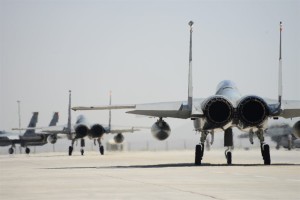Defense Contractors Like Raytheon Aren’t Blameless in Yemen Crisis
Opinion: The bombing of civilians in Yemen's civil war involves many actors, including defense contractors such as Raytheon in Tucson.

All Global Research articles can be read in 27 languages by activating the “Translate Website” drop down menu on the top banner of our home page (Desktop version).
***
The villagers of Arhab were in a celebratory mood before the bomb exploded. The small Yemeni town had just struck water on a new well when a precision-guided munition crashed into the site, killing 31 and maiming many more.
Among the death and debris, investigators would later find a bomb fragment with a serial code indicating it came from Tucson — home of Raytheon Technologies.
The U.S. government is providing the weapons that are destroying a country, and Arizonans are unwittingly involved. We all deserve better.
It’s time to confront the powerful interests of the arms industry, stop arms sales to those who are indiscriminately bombing civilians, and end U.S. complicity in the war in Yemen for good.
Arms sales helped create a disaster
Since 2015, the United States has been militarily backing the authoritarian governments of Saudi Arabia and the United Arab Emirates as they intervene in Yemen’s civil war, including by arming them with more than $85 billion worth of bombs, drones and fighter jets.
These sales have proven to be nothing short of a disaster. U.S.-sold weapons are regularly used to commit apparent war crimes, have repeatedly fallen into the hands of violent non-state actors, and have served only to prolong the conflict.
Yemen’s war rages on today, and the country is now the world’s largest humanitarian disaster – and U.S.-made bombs are partly to blame.
But despite the total failure of this strategy to bring peace or security, the sales continue. There’s a simple explanation for that: the weapons industry wants them to.
Raytheon, others aren’t passive actors
While companies like Raytheon, whose missile program is headquartered in Tucson, pretend that they’re merely passive actors meeting their products’ demand, they actually have a large hand in the decision-making process.
Every year, Raytheon and the rest of the weapons industry spend millions of dollars influencing elections and lobbying for more arms sales – fueling horrific wars like Yemen’s for the sake of profits. The blood money from these sales isn’t going to everyday employees either: while Raytheon assembly workers receive about $37,000 per year, its CEO brings home more than 450 times that.
And it looks like the lobbying is paying off. Late last year, the U.S. Senate narrowly rejected legislation to block part of President Trump’s last-minute $23 billion weapons sale to the UAE when Arizona Sens. Mark Kelly and Kyrsten Sinema defected from the Democratic party to vote “no.”
Understandably, Kelly and Sinema, along with other Arizonans, might worry that jobs depend on these sales. But the fact is, the arms industry is a poor job creator. Every government dollar spent on weapons manufacturing creates less jobs than the same spent on teachers, nurses, frontline pandemic responders, or green energy workers. Places like Huntsville, Ala. — former weapons hot spots that are successfully transitioning to green technology — can show us the way.
We’d be better off without these weapons
Arizonans don’t want their hard work to go toward massacring civilians halfway around the world, and they don’t want their senators voting to sell arms to dictators.
I should know. As a born-and-raised Arizonan and proud UofA alum, I care deeply about what’s best for my home state. And as the digital campaign director of one of the country’s leading anti-militarism advocacy organizations, I have seen Raytheon lobbyists in action as they trample the voices of everyday people from across the country, including our thousands of grassroots activists in Arizona.
With President Biden’s recent decision to pause arms sales to the UAE and Saudi Arabia pending review, we’re closer than ever to ending this terrible practice for good. Now is the time to put the pressure on.
From Arhab to Tucson, the Arabian Desert to the Sonoran, everyday people would be better off without Raytheon’s weapons. It’s time for Arizona to say no to these disastrous arms sales and the corporate powers that back them.
*
Note to readers: please click the share buttons above or below. Forward this article to your email lists. Crosspost on your blog site, internet forums. etc.
Shayna Lewis grew up in Pinetop-Lakeside, AZ, and is digital campaigns director at Win Without War, a Washington D.C.-based group advocating progressive national security solutions. Reach her at [email protected].

